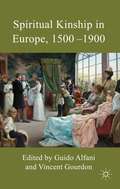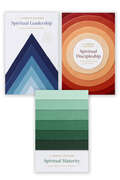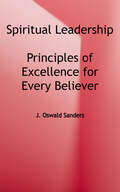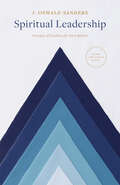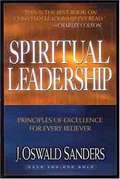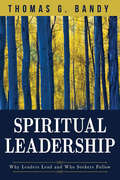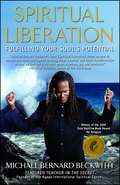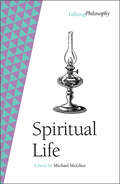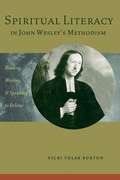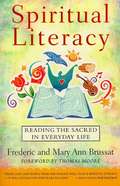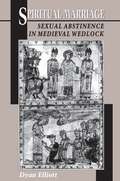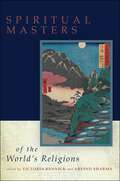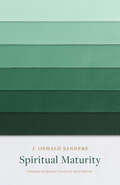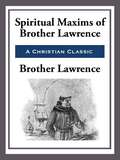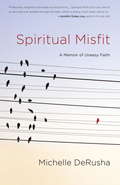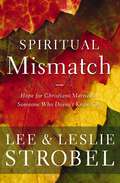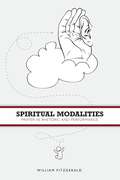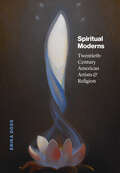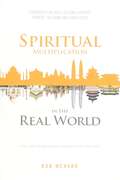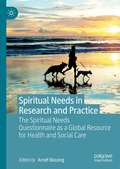- Table View
- List View
Spiritual Kinship in Europe, 1500–1900
by Guido Alfani Vincent GourdonThe authors in this volume analyze spiritual kinship in Europe from the end of the Middle Ages to the Industrial Age. Uniquely comparing Catholic, Protestant and Orthodox views and practices, the chapters look at changes in theological thought over time as well as in social customs related to spiritual kinship, including godparenthood.
Spiritual Leadership, Spiritual Discipleship, Spiritual Maturity Set of 3 Sanders books
by J. Oswald SandersThis set includes all three books of the J. Oswald Sanders' spiritual growth series: Spiritual Leadership, Spiritual Discipleship, and Spiritual Maturity.In Spiritual Leadership, J. Oswald Sanders, a Christian leader for decades and the author of more than forty books, presents the key principles of leadership in both the temporal and spiritual realms. He illustrates those principles throughout with examples from godly figures like Moses, Nehemiah, the apostle Paul, David Livingstone, Charles Spurgeon, and others. With more than 1 million copies sold, this proven classic will help you to frame your leadership as spiritual service. In Spiritual Discipleship, Sanders points out that true discipleship is more than intellectual assent to a belief in Christ; it involves the whole person and lifestyle. This book will help you embody that truth. It examines Jesus&’ teaching on what it means to follow Him, helping you become the kind of Christian Jesus wants you to be—not one devised by man or even other Christians. For anyone who wants to be not just a believer in Christ, but an imitator of Him, this book is a treasured resource. In Spiritual Maturity, Sanders explores the primary source of continual growth. In three parts, structured around the persons of the Trinity, he provides clear direction for those desiring to grow strong spiritually. Complete with scriptural principles for spiritual development and study questions at the end of the text, this classic handbook is a timeless treasure.
Spiritual Leadership, Spiritual Discipleship, Spiritual Maturity Set of 3 Sanders books
by J. Oswald SandersThis set includes all three books of the J. Oswald Sanders' spiritual growth series: Spiritual Leadership, Spiritual Discipleship, and Spiritual Maturity.In Spiritual Leadership, J. Oswald Sanders, a Christian leader for decades and the author of more than forty books, presents the key principles of leadership in both the temporal and spiritual realms. He illustrates those principles throughout with examples from godly figures like Moses, Nehemiah, the apostle Paul, David Livingstone, Charles Spurgeon, and others. With more than 1 million copies sold, this proven classic will help you to frame your leadership as spiritual service. In Spiritual Discipleship, Sanders points out that true discipleship is more than intellectual assent to a belief in Christ; it involves the whole person and lifestyle. This book will help you embody that truth. It examines Jesus&’ teaching on what it means to follow Him, helping you become the kind of Christian Jesus wants you to be—not one devised by man or even other Christians. For anyone who wants to be not just a believer in Christ, but an imitator of Him, this book is a treasured resource. In Spiritual Maturity, Sanders explores the primary source of continual growth. In three parts, structured around the persons of the Trinity, he provides clear direction for those desiring to grow strong spiritually. Complete with scriptural principles for spiritual development and study questions at the end of the text, this classic handbook is a timeless treasure.
Spiritual Leadership: Principles of Excellence for Every Believer (Sanders Spiritual Growth Series)
by J. Oswald SandersThe need for talented, vigorous leaders in the church cannot be overemphasized. Such times demand active service of men and women who are guided by and devoted to Jesus Christ. With more than 1 million copies sold, Spiritual Leadership stands as a proven classic for developing such leadership. J. Oswald Sanders, a Christian leader for nearly seventy years and author of more than forty books, presents the key principles of leadership in both the temporal and spiritual realms. <p><p>He illustrates his points with examples from Scripture and biographies of eminent men of God, such as Moses, Nehemiah, the apostle Paul, David Livingstone, Charles Spurgeon, and others. Featured topics include: - The cost of leadership - The responsibility of leadership - Tests of leadership - The qualities and criteria of leadership - The art of reproducing leaders - The one indispensable requirement of leadership Sanders holds that even natural leadership qualities are God-given, and their true effectiveness can only be reached when they are used to the glory of God. <p><p>Let this classic be your guide for leadership, and watch how God works through you to do great things for His glory.
Spiritual Leadership: Principles of Excellence for Every Believer (Sanders Spiritual Growth Series)
by J. Oswald SandersOver 1 million copies soldWhat every church will always needThe need for talented, vigorous leaders in the church cannot be overemphasized. Such times demand active service of men and women who are guided by and devoted to Jesus Christ.With more than 1 million copies sold, Spiritual Leadership stands as a proven classic for developing such leadership. J. Oswald Sanders, a Christian leader for nearly seventy years and author of more than forty books, presents the key principles of leadership in both the temporal and spiritual realms. He illustrates his points with examples from Scripture and biographies of eminent men of God, such as Moses, Nehemiah, the apostle Paul, David Livingstone, Charles Spurgeon, and others. Featured topics include:The cost of leadership The responsibility of leadership Tests of leadership The qualities and criteria of leadership The art of reproducing leaders The one indispensable requirement of leadershipSanders holds that even natural leadership qualities are God-given, and their true effectiveness can only be reached when they are used to the glory of God. Let this classic be your guide for leadership, and watch how God works through you to do great things for His glory.
Spiritual Leadership: Principles of Excellence for Every Believer (Sanders Spiritual Growth Series)
by J. Oswald SandersOver 1 million copies soldWhat every church will always needThe need for talented, vigorous leaders in the church cannot be overemphasized. Such times demand active service of men and women who are guided by and devoted to Jesus Christ.With more than 1 million copies sold, Spiritual Leadership stands as a proven classic for developing such leadership. J. Oswald Sanders, a Christian leader for nearly seventy years and author of more than forty books, presents the key principles of leadership in both the temporal and spiritual realms. He illustrates his points with examples from Scripture and biographies of eminent men of God, such as Moses, Nehemiah, the apostle Paul, David Livingstone, Charles Spurgeon, and others. Featured topics include:The cost of leadership The responsibility of leadership Tests of leadership The qualities and criteria of leadership The art of reproducing leaders The one indispensable requirement of leadershipSanders holds that even natural leadership qualities are God-given, and their true effectiveness can only be reached when they are used to the glory of God. Let this classic be your guide for leadership, and watch how God works through you to do great things for His glory.
Spiritual Leadership: Principles of Excellence for every Believer
by J. Oswald SandersThis book illustrates biblical leadership principles through the lives of David, Moses, Nehemiah, the Apostle Paul, David Livingston, and Charles Spurgeon.
Spiritual Leadership: Why Leaders Lead and Who Seekers Follow
by Thomas G. BandyThe idea that certain kinds of people gravitate toward certain kinds of leaders has been around for a long time. There are exceptions and degrees of commitment, of course. People (as individuals) are complicated and changeable. On the other hand, people (as groups) are remarkably consistent and predictable.There are patterns. The typical follower of this leader has these characteristics. The typical follower of that leader has those characteristics. Conversely, this group of people tends to look for, believe in, and listen to this kind of leader; and that group of people tends to look for, believe in, and listen to that kind of leader. There are trends. Certain kinds of people are more responsive to certain kinds of leaders. Certain kinds of leaders seem to be more empathic toward, and understanding of, certain kinds of people. They seem to know some contexts, certain needs, and distinct attitudes better than others. If you follow the career of a leader, you can anticipate who they will gather around them and where they will be most effective.Bandy shows how this is true for church leaders too and introduces ideas of different types of leaders attracting different groups of followers. Knowing your "type" will help you know who will be attracted to your leadership style.
Spiritual Liberation: Fulfilling Your Soul's Potential
by Michael Bernard BeckwithWhat would we do if we truly understood the power we have within ourselves, the perfection of our inner being, and the transformation that awaits us? In this handbook for spiritual revolutionaries, Michael Bernard Beckwith challenges readers to search within for the key to unlock their future, preparing them for the great transformation that is theirs to experience.Beckwith is a renowned interfaith minister, crusader for peace and nonviolence, and respected teacher and community leader based out of Los Angeles, California. In his first full-length book, he shares the wisdom from the past, coupled with the revelations of the present, in a powerful, life-changing way. Moving beyond mere theory or rhetoric, the book engages the reader on a personal level, challenging them to take the next step towards transforming their lives in every way. Beckwith believes that people who cultivate their full potential spiritually, mentally, emotionally, professionally and creatively not only experience a more meaningful personal life, they contribute to the development of society that recognizes, honors and nurtures the dignity of the world's peoples. This book offers practical wisdom and practices for redefining and revitalizing the very foundations of life, thus leading to fulfillment and success for individuals and the global society in which we live.Each chapter is filled with insight into the divine blessings that all have been given. The book will show the reader that they are on their way to an amazing spiritual adventure. The book is structured around several core themes, which include: transformation; peace; abundance; and the habits of highly evolved people.
Spiritual Life (Talking Philosophy)
by Michael McGheeThe original claim made in the introduction to this classic volume was that it broke fresh ground: that it set a new agenda for the philosophy of religion and was a reaction against a narrow conception of the discipline that had little to say philosophically about human experience, or subjectivity, or about the religious imagination, or the idea of 'spirituality'. In a new Foreword to the book, Michael McGhee reflects on how the discipline has changed or remained the same in the intervening twenty-five years since first publication. He argues that the connections between 'philosophy' and 'spirituality' are still developing; and that what we think of as 'religious' or 'spiritual' is shifting, along with ideas about self-knowledge. The book contains pertinent chapters by some of the leading thinkers in the field, including Rowan Williams, Janet Soskice, Fergus Kerr, Stephen Clark and Paul Williams, who offers a comparative piece on Tibetan Buddhism.
Spiritual Literacy in John Wesley's Methodism: Reading, Writing, and Speaking to Believe (Studies in Rhetoric and Religion #6)
by Vicki BurtonVicki Tolar Burton argues that John Wesley wanted to make ordinary Methodist men and women readers, writers, and public speakers because he understood the powerful role of language for spiritual formation. His understanding came from his own family and education, from his personal spiritual practices and experiences, and from the evidence he saw in the lives of his followers. By examining the intersections of literacy, rhetoric, and spirituality as they occurred in early British Methodism-and by exploring the meaning of these practices for class and gender-the author provides a new understanding of the method of Methodism.
Spiritual Literacy: Reading the Sacred in Everyday Life
by Frederic Mary Ann Brussat<p>A book that belongs in every seeker's home, Spiritual Literacy answers the universal question, "How can I live a spiritual life every day?" Frederic and Mary Ann Brussat reveal a way to read the texts of our lives and of the world around us for sacred meaning. <p>Using more than 650 brief examples from contemporary books and movies, they tutor us in the art of lingering with our experiences and seeing the world with fresh eyes. They present spiritual perspectives on things, places, nature, animals, leisure, creativity, service, body, relationships, and community. The Alphabet of Spiritual Literacy describes the key spiritual practices -- from attention to zeal -- that spell the meaning in daily life. <p>Here is the book to share with your children, family, colleagues, and friends as you explore together the bounties of the spiritual life.</p>
Spiritual Marriage: Sexual Abstinence in Medieval Wedlock
by Dyan ElliotThe early Christian and medieval practice of spiritual marriage, in which husband and wife mutually and voluntarily relinquish sexual activity for reasons of piety, plays an important role in the development of the institution of marriage and in the understanding of female religiosity. Drawing on hagiography, chronicles, theology, canon law, and pastoral sources, Dyan Elliott traces the history of spiritual marriage in the West from apostolic times to the beginning of the sixteenth century.
Spiritual Masters of the World's Religions
by Arvind Sharma Victoria KennickWhat is a spiritual master? Spiritual Masters of the World's Religions offers an important contribution to religious studies by addressing that question in the context of such themes as charismatic authority, role models, symbolism, and categories of religious perception. The book contains essays by scholar-practitioners on the topic of spiritual masters in Judaic, Christian, Islamic, Hindu, Sikh, Buddhist, Confucian, and Daoist traditions. It provides a full spectrum of exemplars, including founders, spiritual masters who highlight cultural themes, and problematic figures of modern times. To define spiritual master, the work of Max Weber, Mircea Eliade, Daniel Gold, and Bruce Lincoln is referenced to provide a balanced notion that includes both religionist and reductionist perspectives. This book takes readers from the past spiritual masters to the future of masters of any sort, posing food for thought about the future of master-disciple relationships in an emerging age of egalitarian sentiments.
Spiritual Maturity: Principles of Spiritual Growth for Every Believer (Sanders Spiritual Growth Series)
by J. Oswald SandersHow do Christians grow? &“This book invites the reader to experience the title. It is not just a &‘how-to&’ volume, but a &‘be&’ volume.&” So write the editors of this rich resource on the spiritual life. Spiritual maturity is not a level of growth Christians achieve, but the passion to press on in Christ. In these chapters, J. Oswald Sanders explores the primary source of continual growth. In three parts, structured around the persons of the Trinity, Sanders explores matters like:How we should view GodWhy our weakness is God&’s strengthWhat it means that Christ prays for usHow to live like an heir of the KingThe role of the Spirit in a Christian&’s lifeSpiritual Maturity provides clear direction for those desiring to grow strong spiritually. Complete with scriptural principles for spiritual development and study questions at the end of the text, this classic handbook is a timeless treasure.Includes a "For Reflections" section, making it an ideal resource for both individual and group study.
Spiritual Maturity: Principles of Spiritual Growth for Every Believer (Sanders Spiritual Growth Series)
by J. Oswald SandersHow do Christians grow? &“This book invites the reader to experience the title. It is not just a &‘how-to&’ volume, but a &‘be&’ volume.&” So write the editors of this rich resource on the spiritual life. Spiritual maturity is not a level of growth Christians achieve, but the passion to press on in Christ. In these chapters, J. Oswald Sanders explores the primary source of continual growth. In three parts, structured around the persons of the Trinity, Sanders explores matters like:How we should view GodWhy our weakness is God&’s strengthWhat it means that Christ prays for usHow to live like an heir of the KingThe role of the Spirit in a Christian&’s lifeSpiritual Maturity provides clear direction for those desiring to grow strong spiritually. Complete with scriptural principles for spiritual development and study questions at the end of the text, this classic handbook is a timeless treasure.Includes a "For Reflections" section, making it an ideal resource for both individual and group study.
Spiritual Maxims of Brother Lawrence
by Brother LawrenceHere is a small book with the Maxims of Brother Lawrence. The book is set up so that you can absorb these maxims with short, easy readings each day over the course of one month, allowing you ample time to reflect and meditate upon each maxim.
Spiritual Misfit
by Michelle DerushaI decided to admit once and for all that I didn't know what I was doing, what I thought, what I believed, even sometimes if I truly believed. I would tell the truth: I wasn't like them; I didn't fit in. I wasn't a proper Christian. I didn't have it all together like they did. Why not, I figured? What in the world did I have to lose?_____ After twenty years of unbelief, estranged from her childhood faith and ultimately from God, Michelle DeRusha unexpectedly found herself wrestling hard with questions of spirituality-- and deeply frustrated by the lack of clear answers. Until she realized that the questions themselves paved a way for faith. "Declaring my unbelief," writes DeRusha, "was the first step; declaring my unbelief allowed me to begin to seek authentically." Spiritual Misfit chronicles one woman's journey toward an understanding that belief and doubt can coexist. This poignant and startlingly candid memoir reveals how being honest about our questions, our fears, and our discomfort with black-and-white definitions of faith can move us toward an authentic and a deepening relationship with God.
Spiritual Mismatch: Hope for Christians Married to Someone Who Doesn’t Know God
by Lee Strobel Leslie StrobelLee Strobel was the legal editor for the Chicago Tribune, a Yale graduate, and an atheist when his wife, Leslie, became a Christian early in their marriage. She began going to church; she found new friends; she became a different person. But Lee didn’t believe in any of it. Both Lee and Leslie felt they were losing each other. Despite all the emotional clashes they experienced, God answered Leslie’s prayers in miraculous ways. He gave her peace when she was feeling worried, gave her friends to walk with her, and gave her his Holy Spirit to comfort and guide her. Over time, she learned to live out her faith and be an example of Christ’s love to Lee. Today, they’re both Christians and Lee’s conversion story is now a major motion picture, The Case for Christ. In this personal and practical book, Lee and Leslie share the lessons they’ve learned, including Surprising insights into the thoughts of non-Christian spouses Eight principles for reaching out to your partner with the gospel Advice for raising your children in a spiritually mismatched home How to pray for your spouse, with a 30-day guide to get you started Helpful tips on what to do if you’re both Christians but one lags behind spiritually Advice for single Christians about marriage Twelve steps to making the most of your marriage With these trusted principles and helpful suggestions, Lee and Leslie Strobel share God’s peace, encouragement, and hope for your marriage.
Spiritual Modalities: Prayer as Rhetoric and Performance
by William FitzGeraldA bold recasting of prayer as a rhetorical art, Spiritual Modalities investigates situations, strategies, and performative modes of discourse directed to divine audiences. Examining how prayer “works,” Spiritual Modalities reads prayer’s situations and strategies, its characteristic acts and attitudes, to advance an understanding of prayer as a basic expression of our rhetorical capacities for communication and communion. This groundbreaking analysis demonstrates how prayer draws on fundamental capacities to engage other beings rhetorically to argue that we are never more human than when we address the nonhuman. Spiritual Modalities is notable in its aim to articulate a critical rhetoric of prayer in a secular idiom. It draws on contributions to rhetorical theory from Kenneth Burke along with a broad range of classical and contemporary perspectives on audience, address, speech acts, and modes of performance. The book also takes a multicultural and multimodal approach to prayer as rhetorical performance. The texts and practices of prayer represented range across religious traditions and historical eras and include both verbal and physical modes of divine address. The book will be of interest to scholars researching religious language, Burkean approaches to discourse, practices of memory, and media studies.
Spiritual Modalities: Prayer as Rhetoric and Performance
by William FitzGeraldA bold recasting of prayer as a rhetorical art, Spiritual Modalities investigates situations, strategies, and performative modes of discourse directed to divine audiences. Examining how prayer “works,” Spiritual Modalities reads prayer’s situations and strategies, its characteristic acts and attitudes, to advance an understanding of prayer as a basic expression of our rhetorical capacities for communication and communion. This groundbreaking analysis demonstrates how prayer draws on fundamental capacities to engage other beings rhetorically to argue that we are never more human than when we address the nonhuman. Spiritual Modalities is notable in its aim to articulate a critical rhetoric of prayer in a secular idiom. It draws on contributions to rhetorical theory from Kenneth Burke along with a broad range of classical and contemporary perspectives on audience, address, speech acts, and modes of performance. The book also takes a multicultural and multimodal approach to prayer as rhetorical performance. The texts and practices of prayer represented range across religious traditions and historical eras and include both verbal and physical modes of divine address. The book will be of interest to scholars researching religious language, Burkean approaches to discourse, practices of memory, and media studies.
Spiritual Moderns: Twentieth-Century American Artists and Religion
by Erika DossExamines how and why religion matters in the history of modern American art. Andy Warhol is one of the best-known American artists of the twentieth century. He was also an observant Catholic who carried a rosary, went to mass regularly, kept a Bible by his bedside, and depicted religious subjects throughout his career. Warhol was a spiritual modern: a modern artist who appropriated religious images, beliefs, and practices to create a distinctive style of American art. Spiritual Moderns centers on four American artists who were both modern and religious. Joseph Cornell, who showed with the Surrealists, was a member of the Church of Christ, Scientist. Mark Tobey created pioneering works of Abstract Expressionism and was a follower of the Bahá’í Faith. Agnes Pelton was a Symbolist painter who embraced metaphysical movements including New Thought, Theosophy, and Agni Yoga. And Warhol, a leading figure in Pop art, was a lifelong Catholic. Working with biographical materials, social history, affect theory, and the tools of art history, Doss traces the linked subjects of art and religion and proposes a revised interpretation of American modernism.
Spiritual Moderns: Twentieth-Century American Artists and Religion
by Erika DossExamines how and why religion matters in the history of modern American art. Andy Warhol is one of the best-known American artists of the twentieth century. He was also an observant Catholic who carried a rosary, went to mass regularly, kept a Bible by his bedside, and depicted religious subjects throughout his career. Warhol was a spiritual modern: a modern artist who appropriated religious images, beliefs, and practices to create a distinctive style of American art. Spiritual Moderns centers on four American artists who were both modern and religious. Joseph Cornell, who showed with the Surrealists, was a member of the Church of Christ, Scientist. Mark Tobey created pioneering works of Abstract Expressionism and was a follower of the Bahá’í Faith. Agnes Pelton was a Symbolist painter who embraced metaphysical movements including New Thought, Theosophy, and Agni Yoga. And Warhol, a leading figure in Pop art, was a lifelong Catholic. Working with biographical materials, social history, affect theory, and the tools of art history, Doss traces the linked subjects of art and religion and proposes a revised interpretation of American modernism.
Spiritual Multiplication in the Real World: Why some disciple-makers reproduce when others fail.
by Bob McNabbWhy do some disciple-makers reproduce while others fail? Spiritual Multiplication in the Real World takes an in-depth look into this question and gives answers based on solid research and biblical foundations. The solutions presented are inspiring and highly practical. Best of all, the keys to fruitfulness shared are universal principles that work in the “real world.” These principles will help you multiply generations of disciples, wherever you find yourself! BECOME A REPRODUCER: • Don’t just make disciples. Learn to reproduce disciple-makers! • Gain an overview of the discipling process and how to move new believers to maturity and reproduction. • Grasp the keys to successful evangelism and multiplication in the context of a disciple-making team.
Spiritual Needs in Research and Practice: The Spiritual Needs Questionnaire as a Global Resource for Health and Social Care
by Arndt BüssingBased on information gathered from the internationally used Spiritual Needs Questionnaire, this book offers analyses of the spiritual and existential needs among different groups of people such as the chronically ill, elderly, adolescents, mothers of sick children, refugees, patients' relatives, and others. The theoretical background, specific empirical findings and the relevance of addressing spiritual needs is discussed by experts from different professions and cultural contexts. Supporting a person's spiritual needs remains an important task of future healthcare systems that wish to more comprehensively care for the healthcare needs of patients, and of religious communities to ensure that spiritual concerns of all persons, independent of their religious orientations, are met in and outside healthcare settings.
